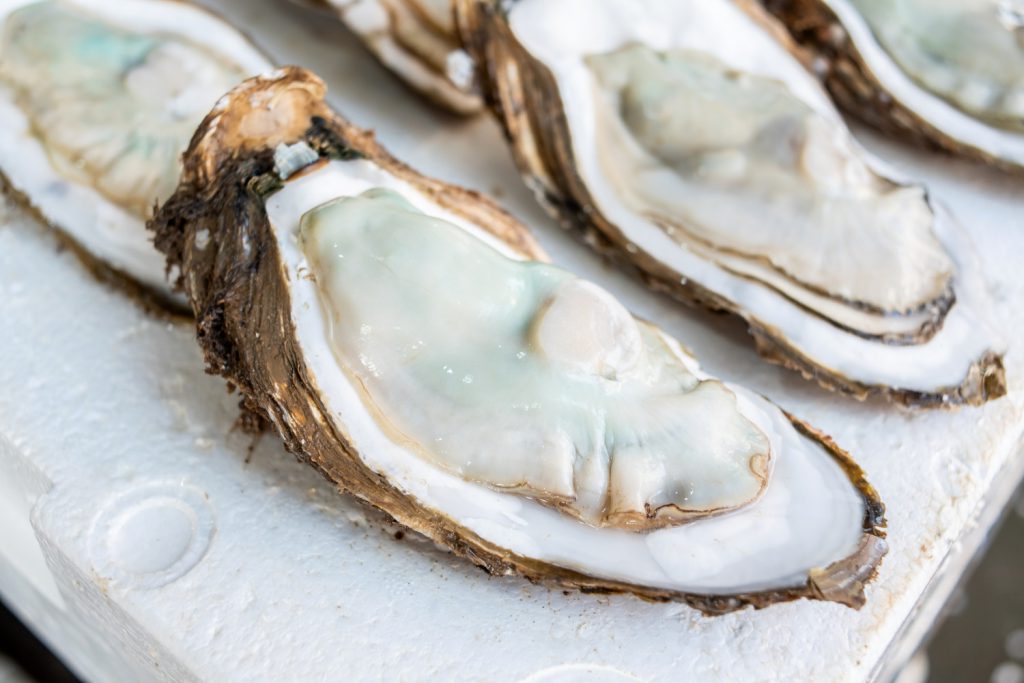
You stare into that cute, warm bulgy eyes, you can feel the craving for the warm oyster bowl in front of you, “there’s love in sharing,” but can you really share some oysters with your pet dog? The real and easy question is can dogs eat oysters?
Wait! Oysters — those slimy, slippery aphrodisiacs. Well, they have some health benefits for us, but what about our pet dogs? Should your pup tag along with you to your favorite oyster bar down the road?
First the good news: This type of fresh seafood generally isn’t harmful.
Of course, this assumes no allergic reactions (rare but possible).
Oysters have been an excellent source of protein, omega-3 fatty acids, and essential minerals like zinc, iron, and selenium. Protein helps your pet maintain healthy muscles. Omega-3s boost all aspects of health, decreasing inflammation and greatly reducing the risk of illness. Zinc promotes healthy joints, iron maintains energy levels, and selenium boosts thyroid health and the immune system.
While there are many benefits to feeding your pet a balanced but varied diet, there are some specific benefits to feeding oysters to your furry buddy.
Oysters are low in calories but are full of nutrients, including healthy fats, minerals, vitamins, and protein. They are packed with Vitamin B12, zinc, iron, and omega-3 fatty acids. By providing your furry friend with one ounce of oysters, you can provide his daily zinc, copper, and omega-3 requirements! That’s not bad for these tiny sea creatures.
As a dog lover who prefers to feeds his/her dog a fresh and raw diet, looking for healthy and nutritionally dense foods to rotate into their diet is paramount. In adding variety to your pup’s meal, it complements the meal for both completeness and flavor.
We recently reviewed the best dog food for a cockapoo with all the necessary information that a Cockapoo owner needs to keep his pup healthy.
Why Not Treat Your Pup’s With Sweet Savory Meals Every Once in a While?
Or play it safe by strictly limiting a pet’s portions, especially when feeding them sea creatures for the first time. There are other considerations as well…
Yes, your favorite pet can eat oysters. In fact, adding some seafood to your best friend’s diet can have so many essential health benefits. In dogs with allergies to chicken and fish, varying seafood can be a very appropriate protein option.
In addition to oysters, your pet can enjoy salmon, cod, haddock, or small oily fish like sardines, smelt, or anchovies. You want to avoid fish like tuna and swordfish as they can contain a very high level of mercury which is quite toxic to both dogs and humans, as research has shown.
How then should I feed oysters to my dog?
If you decide to purchase oysters for your pet dog, you can go for fresh or canned oysters. Do not feed your dog smoked oysters or oysters with preservatives or salt. It is recommended to feed your dog prepared oysters instead of raw oysters. Lightly sauté, bake, boil, or dehydrate before serving.
Basically, oysters should be cooked and the shells removed before consumption. Canned oysters should always be packed in water, not oils or spices.
Dogs Can Enjoy Cooked Oysters
- As an ingredient in canned or dry food
- As a snack or special treat
But give too much and diarrhea would not be surprising.
It cannot be stressed enough: Limit feeding them with few oysters only. And again, prepare this seafood for your dog in a healthy way.
This advice also applies to any other type of seafood you might consider including:
- Mussels
- Winkles
- Scallops
- Any other type of sea snail or molluscs
Our advice is that dogs should not be eating any raw seafoods (oysters included).
Feeding your dog fresh oysters is likely to be uneventful. Sharing is usually not a problem.
If, on the other hand, this seafood doesn’t sit well with your animal’s stomach you can expect diarrhea, allergies, while not totally out of the question, are thankfully uncommon.
But another factor to consider is that your dog could be affected by protist organisms sometimes present in oysters.
If you do ultimately decide to give a taste serve them steamed, never fried!
Fried oysters are not a good choice for dogs — steamed is best
In any case, be sure to closely watch your furry friend afterwards.
Similarly, Dogs Can Eat Maple Syrup. It’s safe for dogs to eat this human food, but moderation is still a key to keeping the dog healthy.
Will Oysters Cause Risk for Salmonella and Other Foodborne Illnesses to the Dog?
You should always avoid feeding your pets raw fish as they are at risk for salmonella and other foodborne illnesses. When preparing fish for yourself or your pet, you want to be sure to use safe food handling practices and not cross-contaminate your food prep areas or your pet’s dinner.
This includes not prepping veggies or sides on the same cutting board as raw fish or other meats. You also need to wash the cutting board, knives, and other kitchen items that touched the raw fish or meat with hot water and soap.
Your safety and health are important, as that of your pets.
When you decide to introduce new foods like oysters to your pet’s diet, be sure to start slowly. Many of your dogs have sensitive stomachs that can easily be upset with big changes in their diets.
Just like you gradually switch your pet to a new food, you also want to add new foods, even fun treats, just as slowly and carefully to minimize the risk of an upset, stomach irritation, or bad reaction.
Oysters Are Good as New Food
As with any food you might consider adding to your pet’s diet, it is important to consider the risk and its benefits to your pet’s health. There are risks worth considering before introducing any new food to your pet’s diet.
There is always the possibility that your pet might be allergic to a new food, including oysters, among many others. Like with any other new food you might consider, introduce oysters to your pet slowly. There is always the possibility of an allergic reaction or even a less serious but still uncomfortable intolerance.
Feed them healthy, but don’t make them over-weight.
To help your pet maintain a healthy weight, you do not want to overfeed them. Keep in mind the fat and calorie content of their food, and don’t overfeed treats, even healthy ones like oysters.
Oysters are filter feeders; as such, they can take in toxins that could make your pet sick. To minimize this risk, be sure to source oysters from clean, cooler waters and ask if your fishmonger tests its product for toxicity. Nevertheless, closely monitor for signs that your dog disagrees with oysters.
While most animals might not show any allergic reaction to seafood, you can’t know until adverse reactions begin to show up.
Oysters Might not Sit Well in Your Dogs Stomach
It’s actually much more likely that oysters wouldn’t sit well with a pet pooch’s stomach. So, always err on the side of caution with the more exotic foods. One could argue that with many other delicious options, sharing oysters isn’t the greatest of ideas. It really is a judgment call.
So, how best do your feed oysters to your pet best-bud? There might be a few tricks to feed your pet correctly to minimize the risk of illness or having a bad reaction.
Oyster shells are not a safe treat for your pet, and you do not want to share these with your dog. If your pet did eat the shell, you want to call your veterinarian right away as the shell can cause a blockage in your dog’s intestine or stomach.
Your best bet, remove oyster from its shell before treating to your pet dogs.
You Can Cook Oysters for Your Dog
Try cooking the oysters as much a possible. By cooking the oysters first, you eliminate the risk of transmitting foodborne illness to your pet. Be sure to cook thoroughly to an internal temperature of 140 degrees Fahrenheit to kill any microorganisms. Oysters can be steamed, roasted, or grilled for your dog as long as they are heated to 140 degrees.
You will want to avoid frying oysters for your dog due to the frying oil’s added fat content. Additionally, many fried oysters are also battered before frying, which is not good for your dog. The fat in the oil and the spices can irritate your pet’s stomach.
Oils also add fat and calories that can lead to rapid weight gain. So, avoid frying or over-spicing your oysters.
Frequently Asked Questions
Can puppies eat oysters?
Can I feed raw oyster to my dog?
Can dog eat smoked oysters?
Wrap Up
The appropriate portion of oysters to serve your pet dog will depend on the size and what else you are planning on feeding them. You may wish to consult with your vet or a canine nutritionist before adding oysters to your pet’s food.
They can tell you how many oysters you can feed at a time as well as how often you should be feeding them to your dog. You want to make sure you are not overfeeding and that you are providing adequate well-rounded nutrition for your best friend.
